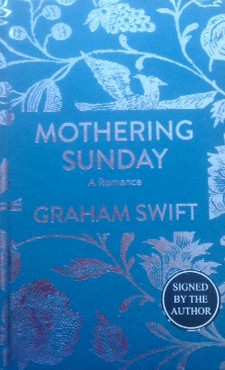Inspiring Older Readers
 posted on 09 Feb 2018
posted on 09 Feb 2018
Mothering Sunday: A Romance by Graham Swift
God knows, I’ve tried to like Graham Swift’s work, I really have. I’m haunted (albeit in a fairly minor way) by the belief that I really ought to. But I don’t. At various times I’ve tried Waterland and Last Orders and found I really couldn’t get on with them and now I can add Mothering Sunday to the list as well.
The novel has at its core the events of an uncharacteristically sunny and balmy Mothering Sunday in 1924. Jane Fairchild, who we learn later in the book is to become a feted and renowned female novelist is just 22 at the time and working as a maid to the Niven family in a house on a country estate. The house is neighboured by a similar pile owned by the Sheringhams who have a son, Paul, who survived the First World War and who will soon be marrying the fragrant but bland Emma Hobday, daughter to another set of landed types. Secretly and for some time, Paul and plain old Jane have been enjoying a vigorous sexual relationship which, we discover, is now coming to its end.
Jane is an orphan and so on this Mothering Sunday finds herself free of obligations and with permission from her employer to go off and enjoy herself for the day as the family will be joining with the Sheringhams and Hobdays to celebrate the impending wedding. Jumping on her bicycle Jane heads off for a liaison with Paul who has stayed at home on the pretence of studying.
The vortex of the novel revolves around what will be the last act of love making between Paul and Jane on this languid Sunday morning. Swift goes into a sort of slow-motion reverie, accumulating the details of their time together as Jane, who is telling the tale, remembers and savours this final encounter.
It turns out to be the final encounter for more than one reason: Paul intends marrying the socially appropriate Emma and there will be no space in that for Jane; Jane will have her epiphany – aided and abetted by Joseph Conrad - and through this become a writer; and, Paul will die on this afternoon.
By the way, that’s not a spoiler because we discover very early on that Paul wont live but we are left with some ambiguity about whether his death was accidental or suicide.
Most of the novella’s second half is the revelation about how Jane becomes a writer, marries, loses her husband to cancer at quite an early age and grows into a much loved author who will die just short of her one hundredth birthday.
Swift makes much of the debt she (and he) owes to Conrad who also died on this same day in 1924. But I was struck by another debt - by what seemed to me to be remarkable similarities between this and Ian McEwan’s On Chesil Beach, parts of which have very much the same almost claustrophobic sense of atmosphere; and both of which end up being fatally holed below the waterline by the problem of writing authentically and convincingly about sex. I do wish authors wouldn’t try and do it because it’s always pitiful and embarrassing.
Swift tries, I think, to evoke the spirit and atmosphere of something like Edward Thomas’s Edwardian end-of-era masterpiece, Adlestrop and then to introduce the worm in the bud. He punctures the charade of class entitlement by the democracy that sex creates - it's hard to sustain class entitlement in the nude and Jane's rugged independence and working class intelligence makes her a willing participant rather than a mere stereotype of an exploited serving girl. And then there's the 'accident' or possible suicide of the heir to the estate who drives his car seemingly unaccountably into a tree. Paul’s death not only marks the tragic end of a family line of inheritance but the end of a social structure characterised by class snobbishness, hypocrisy and moral ambiguity.
So, other than the fact that he doesn’t handle writing about sex very well, why can’t I like it? Well, it’s much the same problem I have with all of Swift’s work that I’ve read so far – I simply can't seem to get past it’s self-conscious literary artfulness. For me there’s always a distance between the author and his creation and in that gap he seems to be inviting us to admire the skill of his construction work. In the obsession with style, humanity is lost somewhere. When we step back from the details and the finely tuned phrases and look at what he’s created I find that I just can never believe his characters are anything more than two dimensional constructs.
This is very much the same problem I had with On Chesil Beach – ultimately Mothering Sunday feels like an artificial confection and a piece of self-conscious artiness written to garner praise for its skilful construction rather than because it has something urgent to say. Both this and the McEwan would have benefitted from being kept as short stories and jolly decent ones they’d have been. As it is Mothering Sunday just makes me feel like this is an author trying to be too clever by three-quarters.
Terry Potter
February 2018